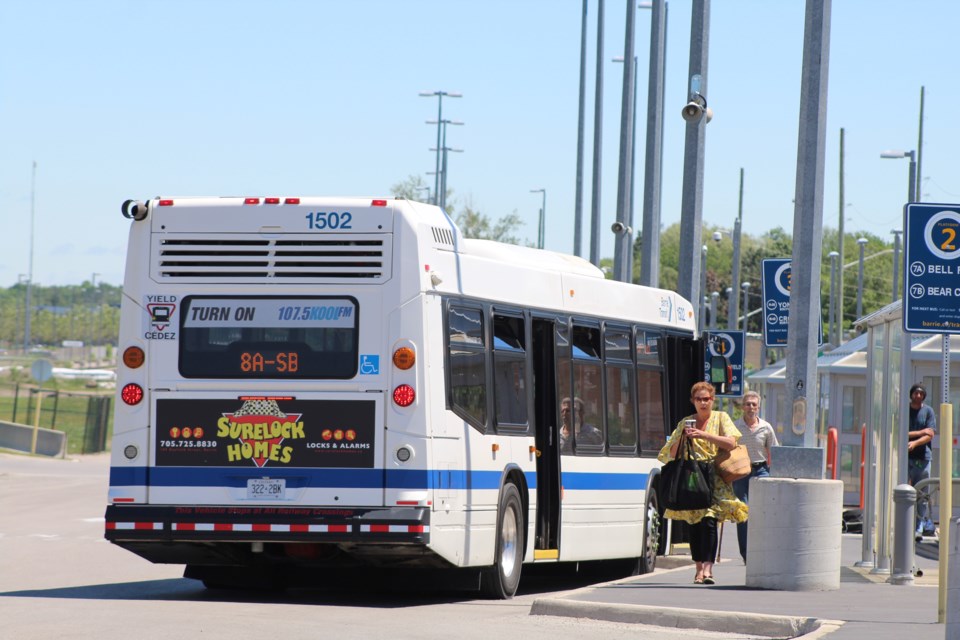A $5.9-billion federal public transit fund isn’t quite rolling yet.
Brent Forsyth, Barrie’s director of transit and parking strategy, said the city awaits information on how the funding can be accessed and for what, after it was announced Wednesday.
“Unfortunately at this time, details of this program have not been released to understand what type of projects will be eligible,” he said. “Whether it’s to assist with recovery from the pandemic, improvements to existing service, technology enhancements or opportunities to grow the service, we are excited to learn more about this program and how we might be able to leverage the potential funding to assist with such initiatives.”
It’s unclear whether the Allandale Transit Hub development could receive this funding. It is to provide transit services and connections between Simcoe County, Muskoka and the Greater Toronto Area.
Barrie Transit’s route system and schedules would be adjusted accordingly when the hub is built. It would have 13 bus bays, ticket-selling services for local and regional transit, parcel receipt, washroom facilities, a waiting area vestibule, offices and retail space.
The principle site of the new transit terminal would be the vacant parcel of land immediately north of the current bus facility at the Allandale Waterfront GO Station, former home to the Barrie Lawn Bowling Club. Buses would enter and leave the site near the corner of Lakeshore Drive and Tiffin Street. The project has been approved to receive up to $7.5 million in combined federal and provincial funding.
The $5.9 billion, which can be accessed starting this year, is to support the recovery from the COVID-19 pandemic.
Ottawa says it is public transit funding that will accelerate ambitious projects and planning to help Canadians move around easier, create new jobs by building major public transit projects, provide dedicated planning funding to accelerate future major projects and support the expansion of large urban transit systems that many Canadians depend upon every day.
The funding is also to reduce pollution and create jobs for Canadians by enhancing public transit systems and switching them to cleaner electrical power, including supporting the use of zero-emission vehicles and related infrastructure. Supporting healthy lifestyles in communities and meeting the growing demand for active transportation projects, including by building walkways and paths for cycling, walking, scooters, e-bikes and wheelchairs, is also part of the plan.
There’s also to be help for Canadians living in rural and remote areas, so they can travel to and from work easier and access essential services, by working with rural, remote and Indigenous communities to identify and create transit solutions to meet their needs.
The importance of safe, modern and efficient public transit systems, the feds say, has been magnified during the pandemic, and public transit will remain a critical element of the sustainable mobility of future cities, providing an efficient way to address congestion and reduce pollution, and enabling people in Canadian communities to access jobs, services and be active participants in those communities.
Investments under this new funding will be directed to projects that best support the recovery from COVID-19 and create the greatest benefits for Canadians.
The federal government also announced Wednesday the creation of a permanent public transit fund of $3 billion annually, beginning in 2026-27. For decades governments have heard from municipalities and transit authorities that a source of permanent and stable funding is essential to allow for careful and long-term project planning and delivery.
During the coming months, Infrastructure Canada will work with provinces, territories, municipalities, local governments, Indigenous communities, transit agencies, policy experts and other stakeholders to develop programming for the $3 billion in permanent public transit funding in a manner that offers the greatest benefits to all Canadians.
Consultations on the design of the new permanent transit funding will begin in the near future to address how all governments can work in partnership to get the most out of investments in public transit.



